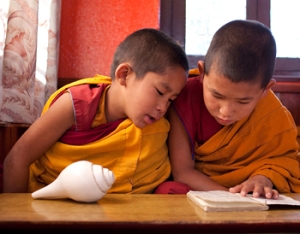Considering the extent and quality of Huihong’s collection of writings–from sutra commentaries to secular poetry–we might expect that his aptitude for composition and learning came early, that the biographies about him would proclaim how he had been one of those kids who had “memorized the Classics by age five” and “showed skill at writing poetry” at a young age. But this was not the case, according to Huihong himself. As prolific and skilled a writer as he was, he was not a child prodigy, by his own account. But nor does his skill appear to have come out of painstaking hair-pulling toil. He had a little help along the way. Here is his own account of the origin of his aptitude for letters:
I was orphaned at a young age. I knew the joy of reading books, but I couldn’t get the the main ideas. When I would set out to write something, it was as if someone kept grabbing at my elbow, or like a mute person who wishes to speak, but his big thick tongue obstructs his ideas. There were many who laughed at me. When I turned sixteen, I studied world transcending dharmas [Buddhism] from Yun’an of Dongshan and suddenly I [gained] self confidence and was without any doubts. I studied seven thousand books that were new to me and wrote a thousand phrases: just one small step and I would arrive! Woo-hoo! In discussing how studying the Dao benefits people, before even mentioning birth and death, seeing how it benefits literary skills, we can be even more self-confident.
“余幼孤,知讀書為樂,而不得其要。落筆嘗如人掣其肘,又如瘖者之欲語而意窒,舌大而濃,笑者數數然。年十六七,從洞山雲庵學出世法,忽自信而不 疑。誦生書七千,下筆千言,跬步可待也。嗚呼!學道之益人,未論其死生之際,益其文字語言如此, 益可自信也。”《石門文字禪》卷二十六《題佛鑑蓄文字 禪》,頁291.
Both Huihong’s parents died when he was just fourteen, (or thirteen by western reckoning). One gets the feeling that the trauma of this loss may have had something to do with his difficulty in reading comprehension and expressing himself. (Otherwise, why does he mention this point in this passage? It should be related to the rest to some degree.) Although he loved to read, he found it difficult to understand the main point of a text. When he would try to write something, it felt like he was being repeatedly interrupted or like a mute person trying to get an idea across. Not only did he struggle, but he was laughed at for his ineptitude. At this time he went to live at a local monastery and was instructed by monks. But he continued to struggle for two more years until he had studied some Buddhism with Master Yun’an 雲庵 (a.k.a. 寶峰克文). This must have been the turning point in his literary career, for it appears to have helped him break through his obstructions and find his voice. If indeed part of his difficulty was due to trauma from losing both parents, studying the no-nonsense Buddhist path to liberation could have been the medicine that helped him break through the attachments and hang ups that were preventing him from fully realizing his literary potential. In any case, Huihong linked the study of Buddhism with his sudden aptitude for reading and writing. Particularly interesting is how he attributes the study of Buddhism to his gaining in self confidence, and self confidence, in turn, was what he needed to advance with his reading and writing. Self confidence seems like such a modern, even western notion, but here we have a monk talking about it as the crucial ingredient that contributed to the beginnings of his literary success.
The final line is a bit complicated and I am still trying to figure out a good translation. He is saying that we don’t even need to talk about how studying the spiritual path can help us with the major problem of birth and death, our self confidence will increase just by seeing how much studying the spiritual path can help develop literary abilities, as it did in his case.
On a personal note, this story resonates so deeply with me that it is almost uncanny. Throughout my life I have struggled to get the main point of readings (although I enjoy them) and to express myself in writing. Furthermore, most of the problem lies in a lack of self confidence. I’ve always thought that perseverance in my school work would gradually help me gain self confidence, and it has to a small degree, but perhaps that is not the best way to develop self confidence. Perhaps I should, like Huihong, devote more time to world transcending Dharmas! It is not intuitive. You think that studying world transcending dharmas will help with liberation from samsara…studying books will help increase worldly knowledge and writing, but perhaps a very kernel of my samsara manifests in the hangups I have in studying books! I don’t know that more book learning/writing is going to help me gain liberation, but, if Huihong’s account is anything to go on, the study of liberation dharmas could very well assist in the book learning. And I could easily see how success in this process could help develop self confidence….and further confidence in the dharma!


Really interesting post. Food for thought indeed. Reminds me of how somewhere in the Master’s lectures he mentioned that increasing intelligence could be helped by sutra reading. Certainly I felt after studying Buddhism I was able to place different views in proper perspective instead of just reacting to them subjectively.
Also makes me think of the Suramgama Sutra, and how knowing all the sutras by heart was not enough to prevent wayward action!